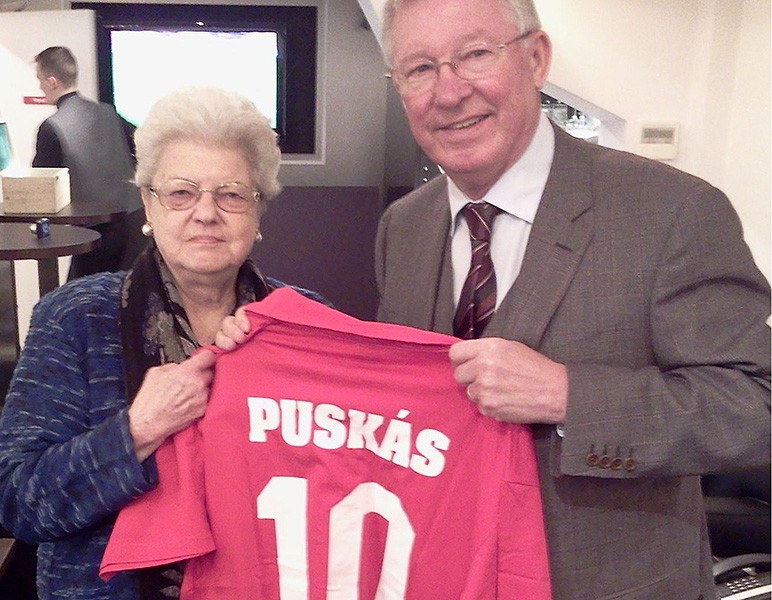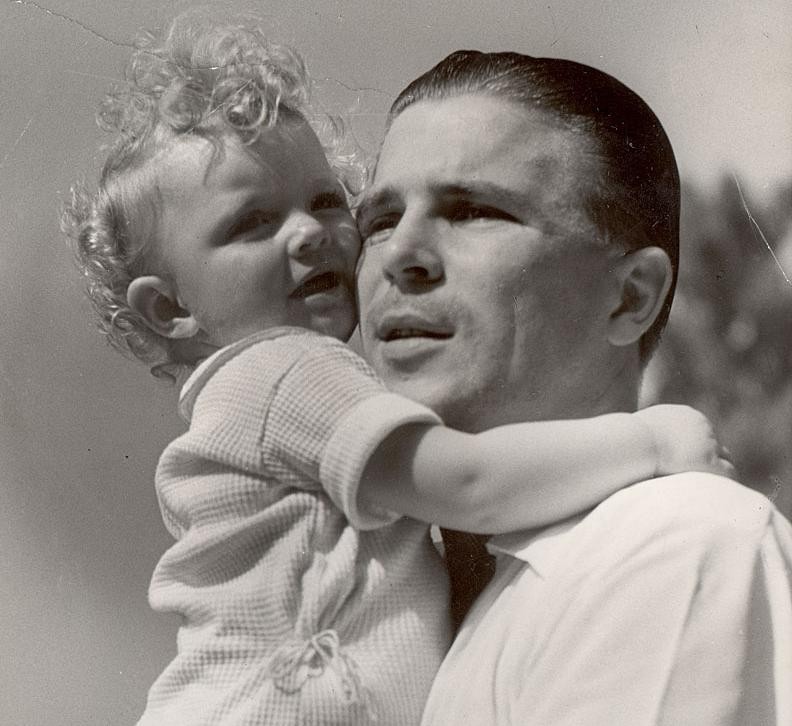Puskás' Daughter: A Life Between Hungary & Spain
Ever wondered about the life of a legend's child, carrying the weight of a famous name while forging their own path? Anikó Puskás, the only daughter of the legendary Ferenc Puskás, lived a life intertwined with football royalty, marked by love, loss, and a deep connection to her Hungarian heritage.
The Puskás family's story is one of international connections. A family from San Sebastián, Spain, traveled to Hungary to personally view the wax statue of the legendary sportsman, Ferenc Puskás, highlighting the enduring global appeal of the football icon. Reka, Anikó Puskás's daughter, is a direct descendant of Hungarian legacy. Anikó Puskás Hunyadvári, as she was also known, was Ferenc Puskás's only child. In 1973, Anikó Puskás married Basque engineer Jesus Damborena, and they initially resided in San Sebastián, Spain. They had two daughters, Elisabeth and Réka, and were blessed with three granddaughters: Maite, Ane, and Sarah. It's a tradition that every generation in the family carries a Hungarian name, maintaining a strong link to their ancestral roots.
| Category | Information |
|---|---|
| Full Name | Anikó Puskás Hunyadvári Damborena |
| Father | Ferenc Puskás |
| Mother | Erzsébet Hunyadvári |
| Birth Date | 1952 |
| Birth Place | Budapest, Hungary |
| Spouse | Jesus Damborena |
| Marriage Date | 1973 |
| Children | Elisabeth Damborena Puskás Réka Damborena Puskás |
| Grand Children | Maite, Ane, and Sarah |
| Death Date | October 19, 2011 |
| Death Place | Valencia, Valencian Community, Spain |
| Resting Place | San Sebastián, Spain (ashes) |
| Nationality | Hungarian, Spanish |
Ferenc Puskas Wikipedia
- Unveil The Secrets Of Bron Breakkers Muscular Physique
- Unveiling The Enigmatic World Of Richarlisons Tattoos A Journey Of Faith Culture And Football
The bond between Ferenc Puskás and his daughter Anikó was legendary, a connection that transcended any physical distance that may have temporarily separated them. Anikó Puskás returned home, and her ashes were laid to rest in the basilica. A photograph from the Puskás Institute shows Ferenc Puskás, his wife Erzsébet, and their daughter Anikó. Ferenc Puskás and Erzsébet Hunyadvári remained steadfastly by each other's side throughout their lives. In the spring of 2009, Anikó, accompanied by her daughters and granddaughters, visited the Puskás Academy in Felcsút. There, the family was personally received and guided by Viktor Orbán, the founder of the institution. When Anikó Puskás was born in 1952 in Budapest, Hungary, her father, Ferenc Puskás, was 25, and her mother, Erzsébet Hunyadvári, was 20. She passed away on October 19, 2011, in Valencia, Valencian Community, Spain, at the age of 59.
The family briefly resided in Austria and Italy before settling in Spain, where Ferenc Puskás played football for Real Madrid for nine years. Anikó was the only child of Ferenc Puskás and his widow, who currently resides in Budapest. The family laid her earthly remains to final rest in San Sebastián, Spain. Erzsébet Hunyadvári was born in 1934 in Budapest. She played handball for Kispest AC, where Puskás played football. The couple married in 1950 in Budapest. They had one daughter, Anikó, who was born in 1952 and died in 2011 in Valencia, Spain.
Reflecting on Anikó Puskás's life, one cannot separate it from the immense shadow cast by her father's fame. Yet, within that context, she carved out her own identity, a woman shaped by Hungarian heritage and international experiences. Her marriage to Jesus Damborena, a Basque engineer, led her to San Sebastián, Spain, a city that would become a significant part of her life. The couple raised their two daughters, Elisabeth and Réka, instilling in them a sense of both Hungarian and Basque identity. This blend of cultures is further reflected in her granddaughters, Maite, Ane, and Sarah, each carrying a Hungarian name as a tribute to their ancestry.
- Unveiling Justin Kans Net Worth Discoveries And Insights
- Ross Malinger 2023 Uncovering His Latest Triumphs
The enduring love between Ferenc Puskás and his daughter Anikó is a recurring theme in the family's narrative. Despite any physical distance that may have separated them at times, their bond remained unbreakable. The decision to lay Anikó's ashes to rest in the basilica underscores the deep respect and affection the family held for her. The photograph from the Puskás Institute, capturing Ferenc, Erzsébet, and Anikó together, serves as a poignant reminder of their close-knit family. The visit to the Puskás Academy in Felcsút in 2009, accompanied by her daughters and granddaughters, highlights Anikó's commitment to preserving her father's legacy and sharing it with future generations. Viktor Orbán's personal reception and tour of the academy further emphasize the significance of the Puskás family in Hungarian history.
Anikó Puskás's early life was marked by her father's burgeoning football career. Born in Budapest in 1952, she witnessed firsthand the dedication and skill that propelled Ferenc Puskás to international stardom. Her mother, Erzsébet Hunyadvári, also had a connection to the sporting world, playing handball for Kispest AC, the same club where Puskás made his name. This shared passion for sports likely played a role in their initial meeting and subsequent marriage in 1950. As Ferenc Puskás's career took him to Austria, Italy, and eventually Spain, Anikó experienced life in different countries, adapting to new cultures and languages. This exposure broadened her horizons and shaped her into a worldly and adaptable individual.
The decision to settle in Spain was a pivotal moment in the Puskás family's history. Ferenc Puskás's nine-year stint with Real Madrid cemented his status as a global icon, and Spain became a second home for the family. Anikó, along with her mother, embraced the Spanish culture while maintaining their Hungarian identity. The years spent in Spain were undoubtedly formative, shaping Anikó's perspectives and influencing her future choices. Even after her father's playing career ended, the family maintained strong ties to Spain, eventually leading to Anikó's marriage to Jesus Damborena and her long-term residence in San Sebastián.
Anikó Puskás's death in Valencia, Spain, on October 19, 2011, at the age of 59, marked the end of an era. Her passing was mourned by family, friends, and fans of Ferenc Puskás around the world. The decision to lay her ashes to rest in San Sebastián reflects the deep connection she had forged with the city and its people. Her legacy lives on through her daughters, Elisabeth and Réka, and her granddaughters, Maite, Ane, and Sarah, who continue to carry the Puskás name with pride. Anikó Puskás's life, though intertwined with her father's fame, was ultimately her own, a testament to her resilience, adaptability, and unwavering love for her family and heritage.
The Puskás legacy continues to resonate in Hungary and beyond. The Puskás musical, a theatrical production that celebrates the life of the most famous Hungarian and the Golden Team, serves as a fitting tribute to his memory. The musical's creators, Szente Vajk, Galambos Attila, and Juhász Levente, have repeatedly demonstrated their talent in bringing historical events to life on stage. Their successful play is based on real events and faithfully portrays the era in which it takes place, ensuring that the Puskás story continues to inspire and entertain audiences for generations to come. The enduring popularity of the Puskás musical is a testament to the lasting impact of Ferenc Puskás and his family on Hungarian culture.
Erzsébet Hunyadvári's early life also played a significant role in shaping the Puskás family. Born in Budapest in 1934, she was a talented handball player for Kispest AC, where she first met Ferenc Puskás. Their shared passion for sports brought them together, leading to their marriage in 1950. Erzsébet was a strong and supportive partner for Ferenc, providing him with a stable home life as he navigated the challenges of his football career. Her influence on Anikó was undoubtedly profound, instilling in her a sense of discipline, resilience, and appreciation for Hungarian culture. Erzsébet's dedication to her family and her unwavering support for her husband's career are integral to the Puskás family's story.
The story of Anikó Puskás is not just a tale of lineage; it is a portrait of a woman who navigated the complexities of fame, cultural identity, and personal relationships with grace and strength. Her life, though marked by the achievements of her father, was uniquely her own, a testament to her resilience, adaptability, and unwavering love for her family and heritage. From her early years in Budapest to her later life in Spain, Anikó Puskás embraced the challenges and opportunities that came her way, leaving behind a legacy that extends far beyond the football field. Her story serves as an inspiration to those who seek to forge their own path while honoring their roots.
Anikó Puskás's life can be viewed through the lens of cultural adaptation and the preservation of heritage. Growing up in a household steeped in Hungarian tradition, she also embraced the cultures of the countries where her family resided, particularly Spain. This ability to navigate different cultural landscapes enriched her life and broadened her perspectives. The tradition of giving each generation in her family a Hungarian name is a testament to her commitment to preserving her ancestral roots. This conscious effort to maintain a connection to her heritage ensured that the Puskás legacy would continue to thrive across generations.
The establishment of "Puskár Kerámia Puskár Anikó e.V." in Debrecen, Hungary, further exemplifies the diverse interests and talents within the Puskás family. While not directly related to Ferenc Puskás or Anikó Puskás's immediate family, it demonstrates the entrepreneurial spirit and artistic endeavors that have emerged within the broader Puskás lineage. The contact information provided, including phone numbers and address, suggests a thriving business that contributes to the local economy. This venture highlights the diverse ways in which the Puskás name continues to be associated with creativity, innovation, and community engagement.
The story of Anikó Puskás is a reminder that even within the most extraordinary families, individual lives are shaped by unique experiences and choices. Her journey from Budapest to Spain, her marriage to a Basque engineer, and her dedication to preserving her Hungarian heritage all contribute to a rich and complex narrative. While her father's fame undoubtedly influenced her life, Anikó Puskás ultimately forged her own path, leaving behind a legacy of love, resilience, and cultural pride. Her story is a testament to the enduring power of family, the importance of heritage, and the ability to find one's own identity in the midst of extraordinary circumstances.
Further delving into the details of Erzsébet Hunyadvári's life provides a deeper understanding of the woman who raised Anikó Puskás. Her involvement in handball at Kispest AC not only highlights her athletic abilities but also underscores the sporting environment in which Anikó grew up. Erzsébet's presence at Kispest AC paved the way for her meeting with Ferenc Puskás, setting in motion a series of events that would shape the lives of their daughter and future generations. Her dedication to her own athletic pursuits, coupled with her unwavering support for her husband's career, paints a picture of a strong and independent woman who played a vital role in the Puskás family's success.
The details surrounding Anikó Puskás's death in Valencia, Spain, offer a glimpse into the final chapter of her life. While the circumstances of her passing remain relatively private, the fact that she spent her last days in Valencia suggests a continued connection to Spain and its culture. The decision to lay her ashes to rest in San Sebastián further underscores the significance of this city in her life. The outpouring of grief that followed her death serves as a testament to the impact she had on those who knew her, both within Hungary and Spain. Her legacy lives on through her daughters and granddaughters, who continue to honor her memory and celebrate her life.
Anikó Puskás's life stands as a testament to the power of family, the importance of cultural heritage, and the ability to forge one's own identity in the face of extraordinary circumstances. Her story is a reminder that even within the most famous families, individual lives are shaped by unique experiences and choices. Anikó Puskás embraced the challenges and opportunities that came her way, leaving behind a legacy of love, resilience, and cultural pride that will continue to inspire generations to come.
Beyond the sporting achievements and international fame, the essence of the Puskás family lies in the enduring bonds of love and loyalty that connected its members. The relationship between Ferenc Puskás and his daughter Anikó, the unwavering support of Erzsébet Hunyadvári, and the commitment to preserving Hungarian heritage all contribute to a narrative that transcends the football field. The Puskás family's story is a reminder that true legacy is not solely defined by accomplishments but also by the values and traditions that are passed down from one generation to the next. Their story serves as an inspiration to families around the world, encouraging them to cherish their connections, celebrate their heritage, and strive for excellence in all their endeavors.
The influence of the Puskás family extends beyond the realm of sports and into the cultural fabric of Hungary. The Puskás musical, the establishment of the Puskás Academy, and the ongoing efforts to preserve Ferenc Puskás's legacy all contribute to a sense of national pride and identity. The Puskás name has become synonymous with excellence, dedication, and a unwavering commitment to Hungarian values. The family's story serves as a source of inspiration for young people, encouraging them to pursue their dreams and strive for greatness, both on and off the field. The Puskás legacy is a testament to the power of sports to unite a nation and inspire future generations.
Anikó Puskás's journey through life offers a compelling study in cultural adaptation and the preservation of identity. Raised in a Hungarian household during a period of significant political and social change, she later embraced the cultures of Spain and the Basque Country. This ability to navigate different cultural landscapes enriched her life and broadened her perspectives. The tradition of giving each generation in her family a Hungarian name serves as a powerful symbol of her commitment to preserving her ancestral roots. Anikó Puskás's life serves as an example of how one can maintain a strong sense of identity while embracing the opportunities and challenges of a globalized world.
Ultimately, the story of Anikó Puskás is a reminder that even within the most extraordinary families, individual lives are shaped by unique experiences and choices. Her journey from Budapest to Spain, her marriage to a Basque engineer, and her dedication to preserving her Hungarian heritage all contribute to a rich and complex narrative. While her father's fame undoubtedly influenced her life, Anikó Puskás ultimately forged her own path, leaving behind a legacy of love, resilience, and cultural pride that will continue to inspire generations to come. Her story is a testament to the enduring power of family, the importance of heritage, and the ability to find one's own identity in the midst of extraordinary circumstances. Anikó Puskás's life is a testament to the enduring power of family, the importance of heritage, and the ability to find one's own identity in the midst of extraordinary circumstances.
Hatha j\u00f3ga oktat\u00f3 (ryt 200), n\u0151i j\u00f3ga oktat\u00f3 (body \u2018n\u2019 soul wellness academy), d\u00fala. A kispesti ac 16 \u00e9ves k\u00e9zilabd\u00e1z\u00f3jak\u00e9nt ismerkedett meg pusk\u00e1s ferenccel, az egyes\u00fclet futballszt\u00e1rj\u00e1val. Anik\u00f3 pusk\u00e1s was born in 1952, in birth place, to ferenc pusk\u00e1s and erzs\u00e9bet pusk\u00e1s (born hunyadv\u00e1ry). Anik\u00f3 passed away on month day 2011, at age 59 in death place. A pusk\u00e1s musical a legh\u00edresebb magyar ember \u00e9s az aranycsapat t\u00f6rt\u00e9net\u00e9t dolgozza fel, \u00e9s \u00e1ll\u00edt m\u00e9lt\u00f3 eml\u00e9ket neki. A darab szerz\u0151i szente vajk, galambos attila \u00e9s juh\u00e1sz levente m\u00e1r t\u00f6bbsz\u00f6r bizony\u00edtott\u00e1k tehets\u00e9g\u00fcket. Sikeres sz\u00edndarabjuk val\u00f3s esem\u00e9nyeken nyugszik, \u00e9s h\u0171en mutatja be a kort, amelyben j\u00e1tsz\u00f3dik. Erzs\u00e9bet hunyadv\u00e1ri was born in 1934 in budapest. She played handball in kispest ac where pusk\u00e1s payed football. The couple married in 1950 in budapest. They had one daughter, anik\u00f3 who was born in 1952 and died in 2011 in valencia, spain. Pusk\u00e1r ker\u00e1mia pusk\u00e1r anik\u00f3 e.v. +36 20 94 22 892 +3670 729 6828. 4032 debrecen, f\u00fcredi \u00fat 76. (az unix f\u0151bej\u00e1rat\u00e1t\u00f3l jobbra a m\u00e1sodik ajt\u00f3) nyitvatart\u00e1s:
- Discover The Secrets And Wonders Of Aloni Arenas Unlocking New Insights
- Unveiling A World Of Comfort Discover The Gems Of Hotel In Freeport Bahamas

Ferenc Puskás Anikó Puskás Colección personal de Ferenc Puskás La

Puskás Anikó AUM Jóga és Önismeret

Fotók Galéria Puskás Ferenc hivatalos emlékoldala